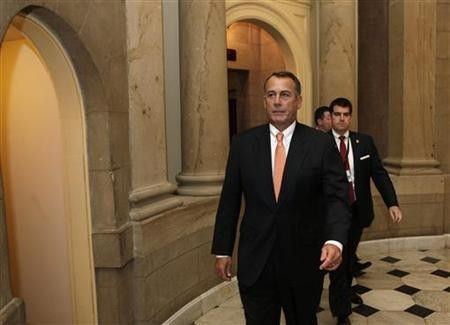Lawmakers Get Tentative Deal on Payroll Tax, Jobless Benefits

By Thomas Ferraro and Donna Smith
WASHINGTON | Tuesday, Feb. 14, 2012 8:52pm EST
(Reuters) - United States lawmakers reached a tentative deal on Tuesday on legislation aimed at boosting the economy by extending a payroll tax cut for 160 million workers through this year and continuing long-term jobless benefits, congressional aides said.
The tentative agreement, mainly negotiated by Democratic Senator Max Baucus and Republican Representative Dave Camp, is expected to be formally signed on Wednesday by the bipartisan negotiating panel they head. That would clear the way for a House of Representatives vote possibly by week's end.
The agreement contains a complicated formula for long-term jobless benefits that would allow both Democrats and Republicans to declare victory. The maximum number of weeks to collect unemployment benefits, currently at 99, would gradually fall to 73 by year's end, according to congressional aides.
Congressional Democrats had been pushing to keep the 99-week maximum for jobless benefits because millions of Americans are still struggling to find jobs, while Republicans wanted a 59-week cap. A 79-week compromise has been proposed by Obama.
Details of the accord were outlined late on Tuesday to Republican House members. A senior House Republican aide told Reuters the deal's fate was still unclear.
Following the meeting of House Republicans, some balked at adding $100 billion to U.S. deficits by not covering the cost of lost revenues associated with extending the payroll tax cut through Dec. 31. What I heard I don't like, Representative Phil Gingrey told reporters.
But many Republicans seemed resigned to the deal's passage.
I think the mood [of House Republicans] was to get it off the table, freshman Representative Dennis Ross said.
If the Republican-controlled House passes the bill, it still would have to be approved by the Democratic-controlled Senate.
Barring last-minute hitches, the deal would end a battle that has raged in Congress for months over the effectiveness of the payroll tax cut in stimulating the economy and extending long-term unemployment benefits amid an 8.3 percent national unemployment rate.
Democrats tout both measures as important to short-term economic growth at a time when the economy is showing signs of strengthening. The tax cut and jobless benefits could pump around $130 billion into the economy over the next 10 months.
The payroll tax cut has sown division among Republicans, many of whom have questioned its economic benefits, and it has left the party vulnerable to Democratic attacks that it favors tax cuts for the wealthy but not for middle-class Americans.
Earlier on Tuesday, as Democratic and Republican negotiators worked on the final details of a broad agreement, President Barack Obama upped the pressure, telling lawmakers not to derail the economic recovery by allowing the measures to expire at the end of the month.
'WITHOUT DRAMA'
Congress needs to extend that tax cut along with vital insurance lifelines for folks who have lost their jobs during this recession, Obama said at the White House. And they need to do it now without drama and without delay.
The payroll tax cut and unemployment benefits are due to expire on Feb. 29.
The tentative deal came together a day after House Speaker John Boehner and his top lieutenants dropped their demand for spending cuts to cover the loss in revenues from extending the payroll tax cut for another 10 months.
The agreement, if finalized, would extend a 2-percentage-point payroll tax cut through 2012 with no offsetting spending cuts.
Republicans have made deficit reduction their mantra as they try to paint Obama as a tax-and-spend liberal who has plunged the country deeper into debt. But with Republican leaders abandoning their demand that the payroll tax cut be paid for, their deficit-reduction message becomes less consistent.
The payroll tax fight has tested Boehner's leadership, especially with fellow Republicans who are aligned with the conservative Tea Party movement that advocates small government. Political pundits will be watching the House vote on this legislation to see if many Republicans abandon their leaders and vote against it in this election year.
As part of the deal, doctors treating elderly Medicare patients would be spared steep pay cuts for the rest of this year. Without congressional action, doctors face 27 percent cuts in reimbursement at the end of the month.
Some of the costs of maintaining doctor fees and continuing long-term jobless benefits will be covered by increased government auctions of Internet and broadcast airwaves, according to lawmakers and aides.
(Additional reporting by Richard Cowan and David Lawder; Editing by Mary Milliken and Will Dunham)
© Copyright Thomson Reuters 2024. All rights reserved.






















